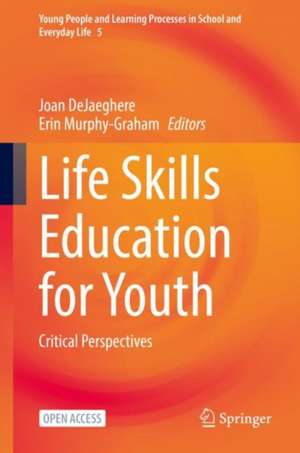Life Skills Education for Youth: Critical Perspectives: Young People and Learning Processes in School and Everyday Life, cartea 5
Editat de Joan DeJaeghere, Erin Murphy-Grahamen Limba Engleză Paperback – 24 noi 2021
Life skills education has gained considerable attention by education policymakers, researchers and educators as being the sine qua non for later achievements in life. It is nearly ubiquitous in global and national education policies, including the SDGs, because life skills are regarded as essential for a diverse set of purposes: reducing poverty, achieving gender equality, promoting economic growth, addressing climate change, fostering peace and global citizenship, and creating sustainable and healthy communities. Yet, to achieve these broad goals, questions persist as to which life skills are important, who needs to learn them, how they can be taught, and how they are best measured. This book addresses these questions.
| Toate formatele și edițiile | Preț | Express |
|---|---|---|
| Paperback (1) | 295.38 lei 38-44 zile | |
| Springer International Publishing – 24 noi 2021 | 295.38 lei 38-44 zile | |
| Hardback (1) | 386.00 lei 38-44 zile | |
| Springer International Publishing – 24 noi 2021 | 386.00 lei 38-44 zile |
Preț: 295.38 lei
Nou
Puncte Express: 443
Preț estimativ în valută:
56.52€ • 59.02$ • 46.67£
56.52€ • 59.02$ • 46.67£
Carte tipărită la comandă
Livrare economică 11-17 aprilie
Preluare comenzi: 021 569.72.76
Specificații
ISBN-13: 9783030852160
ISBN-10: 3030852164
Pagini: 276
Ilustrații: XVI, 276 p. 1 illus.
Dimensiuni: 155 x 235 mm
Greutate: 0.41 kg
Ediția:1st ed. 2022
Editura: Springer International Publishing
Colecția Springer
Seria Young People and Learning Processes in School and Everyday Life
Locul publicării:Cham, Switzerland
ISBN-10: 3030852164
Pagini: 276
Ilustrații: XVI, 276 p. 1 illus.
Dimensiuni: 155 x 235 mm
Greutate: 0.41 kg
Ediția:1st ed. 2022
Editura: Springer International Publishing
Colecția Springer
Seria Young People and Learning Processes in School and Everyday Life
Locul publicării:Cham, Switzerland
Cuprins
Section 1: Examining Life Skills Education Scholarship and Programs for Youth.- 1. Life skills for adolescents in developing countries: What are they and why do they matter?.- 2. Linking Life Skills Education and Social-Emotional Learning: From Conceptualization to Practical Application in a Global Context.- 3. Life skills for ‘at risk’ youth: From individual life skills to a relational approach.- 4. A social justice based approach to life skills: Insights from the Prerna School.- Section 2: Empirical Cases of Life Skills Education.- 5. Transfer and re-contextualization of life skills education: Case studies from Uganda.- 6. Employability and Soft Skills Curriculum Development in Context.- 7. Career skills as Education for Sustainable Development (ESD) competencies: Bridging the personal and the political.- 8. Incorporating life skills for developing personal agency to prevent child marriage: A case study from rural areas of Honduras.- 9. Developing girls’ life skills through sport: Are programs measuring up to the task? .- 10. Conclusion.
Notă biografică
Joan DeJaeghere is a Professor of Comparative and International Development Education in the Department of Organizational Leadership, Policy, and Development at the University of Minnesota. Her scholarly work and professional practice are concerned with how inequities are produced and transformed in and through education, using a critical capability approach to foster justice-enhancing possibilities. The different strands of her research examine gender, caste, class and ethnic inequalities in education, and how education (both schooling and non-formal) can foster inclusive citizenship. Dr. DeJaeghere has published 2 books, including Educating entrepreneurial citizens: Neoliberalism and youth livelihoods in Tanzania (Routledge, 2017) and Education and youth agency (Springer, 2016). She has been the principal or co-principal investigator of several longitudinal (qualitative and mixed-methods) research projects of education and youth livelihoods (East Africa), life skills and girls' educational engagement (India), and women's empowerment and livelihoods (Vietnam). Her work has been used to inform educational practices by governments, non-governmental organizations, and international donors.
Textul de pe ultima copertă
This open access book critically reviews a diverse body of scholarship and practice that informs the conceptualization, curriculum, teaching and measurement of life skills in education settings around the world. It discusses life skills as they are implemented in schools and non-formal education, providing both qualitative and quantitative evidence of when, with whom, and how life skills do or do not impact young women’s and men’s lives in various contexts. Specifically, it examines the nature and importance of life skills, and how they are taught. It looks at the synergies and differences between life skills educational programmes and the way in which they promote social and emotional learning, vocational/employment education, and health and sexuality education. Finally, it explores how life skills may be better incorporated into education and how such education can address structures and relations of power to help youth achieve desired future outcomes, and goals set out in the Sustainable Development Goals (SDGs).
Life skills education has gained considerable attention by education policymakers, researchers and educators as being the sine qua non for later achievements in life. It is nearly ubiquitous in global and national education policies, including the SDGs, because life skills are regarded as essential for a diverse set of purposes: reducing poverty, achieving gender equality, promoting economic growth, addressing climate change, fostering peace and global citizenship, and creating sustainable and healthy communities. Yet, to achieve these broad goals, questions persist as to which life skills are important, who needs to learn them, how they can be taught, and how they are best measured. This book addresses these questions.
Caracteristici
Calls for critical conceptualizations of life skills Offers examples and considerations for reframing life skills conceptually and pedagogically Draws on a review of theoretical, methodological, and empirical literature on life skills This book is open access, which means that you have free and unlimited access







